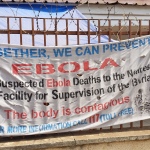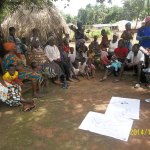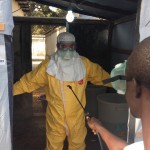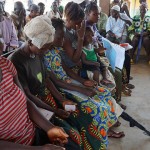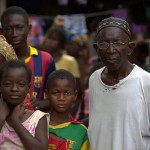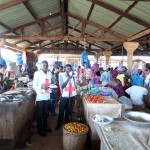The Sierra Leonean diaspora was active in responding to the Ebola outbreak that hit Sierra Leone in March 2014, both by providing financial and material support, and through direct communication with relatives, friends and colleagues back home. This paper looks at the role of diaspora communications on health seeking behaviour in Sierra Leone. It examines the range of communication strategies employed by members of the diaspora; the dynamics of communications as the epidemic spread during 2014/15, and the role of diaspora associations in liaising with
Continue reading →
The Community Led Ebola Action (CLEA) has empowered communities to do their own analysis and take their own action to become Ebola-free in Sierra Leone. CLEA has focused on triggering collective action by inspiring communities to understand the urgency and the steps they take to protect themselves from Ebola. Community Mobilisers have facilitated this process and communities have modified norms, beliefs and behaviours in response to the conditions around them. The CLEA Approach was used to trigger 9,285 communities in Sierra Leone as of April
Continue reading →
This briefing explores how rumours about Ebola in Sierra Leone influences people’s perception and response to Ebola, from the political, historical and social perspectives. Despite the efforts of the World Health Organisation to control the Ebola outbreak, achieving zero cases and providing support for survivors, rumours about the cause of Ebola and the response to it continue to circulate. These rumours, a product of the initially over stretched and poorly implemented Ebola response, were more often linked to long-term issues of structural violence that also contributed to the unprecedented
Continue reading →
The CLEME (Community Led Ebola Man- agement and Eradication) programme aims at triggering the behavioural change needed by the communities to strengthen community resilience to the outbreak and prevent further resurgence by ensuring real and sustainable improvements through: Providing the communities with the means to conduct their own appraisal and analysis of the Ebola outbreak, their safety regarding the disease and its con- sequence if nothing is done; Instilling a feeling of urgency in engaging in community actions that will prevent the community experiencing infections; Supporting
Continue reading →
The Ebola outbreak in West Africa differed from others in its unprecedented size and the high proportion of human-to-human transmission occurring in the community. This report presents an analysis of the impact of Community Care Centres (CCCs) on communities in Sierra Leone. Much has been written about the leadership and coordination of the response – or the lack of it. The emphasis of this evaluation is on the views on the development, implementation and relevance of the CCCs from the perspective of the communities next
Continue reading →
There have been numerous recent analyses of the different manifestations of ‘resistance’ and ‘reticence’ that continue to be critical in Guinea. The socio-historical context that has contributed to deep-rooted mistrust of the State and authority (a sense of ‘abandonment’ [the West has only returned to intervene in Guinea to ‘count cases’ and international actors will again abandon the country when cases are ‘acceptably low’]; heavy-handed or repressive interventions; the perception that elites treat people as if they are disposable and unworthy etc.) is well recognised.
Continue reading →
